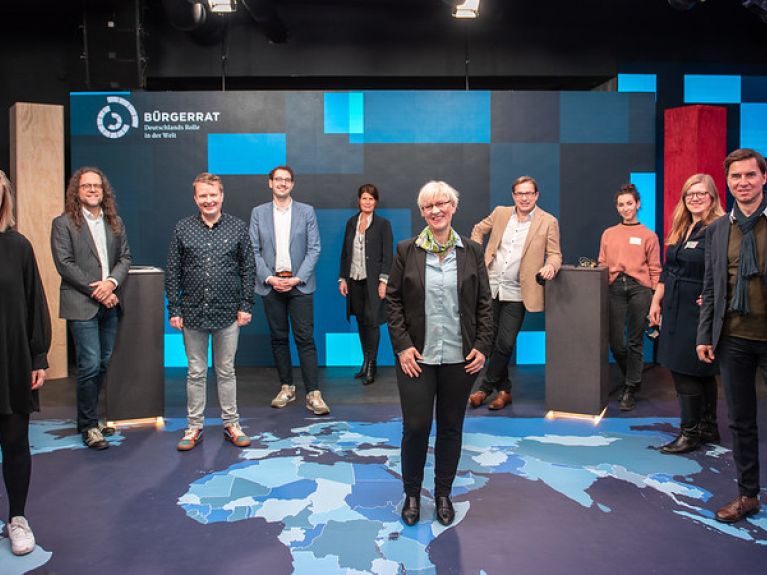What should be Germany’s role in the world?
What kind of foreign policy would reflect how Germany’s citizens see the world? A group of more than 150 'ordinary people' spent two months drawing up their recommendations for the country's politicians.

"Germany's Role in World " — In the light of growing expectations of Germany around the globe, the parliamentary parties in the Bundestag wanted to find out what ordinary citizens thought.
Citizens were invited to apply to take part in the online deliberations. 154 were selected according to age, gender, education, place of residence, the size of the town or settlement in which they live, and ethnic background. The result, according to the organization "Mehr Demokratie"(More Democracy),which set up the deliberations, was a council that "reflected the population of Germany" as accurately as possible.
The chosen members of the citizens' council were furnished with extensive information by a panel of more than 40 specialists. The task given to these specialists was to outline the pro and cons of issues and solutions and provide a basis on which participants could form and formulate their own views.
Imme Scholz, deputy director of the German Institute for Development Policy was one of the advisors. She said she got the impression that the people taking part were well able to deal with foreign policy. "Citizens are often much more advanced than politicians think." Participants confirmed her analysis. "What do I know?" was Daniel Betz' first response when he saw the invitation. But within a few sessions, he says, "it was great taking in all the information and thinking about the issues for myself."
Broad support
It was the organization "More Democracy" that launched the project and it found a willing supporter in Wolfgang Schäuble, the president of the Bundestag. "I am excited to find out what ideas the citizens' council comes up with," said Schäuble at the launch of the project.
Now, he's got the answer: that Germany should be more outspoken and assertive about defending its values in the outside world. The majority of the council was of the clear view that Germany should speak up louder and clearer about human rights abusesand breaches of the rule of law, especially with regard to Turkey and China.
"We wanted more courage, without worrying too much about day-to-day politics and real-life constraints and considerations," was how Elisabeth Grützmacher described her approach and that of many others on the council. The seventeen-year-old high school student was one of those chosen to represent a certain section of the population as part of the overall effort to include all regions, age groups, genders, and life circumstances.
"It was an exciting experience. We took our task very seriously," explained Daniel Betz, 52, a specialist advisor to a clinic. And Charlotte Volkert, 35, social worker, added "We wanted to encourage a different approach — and a clearer stance."
More money for defense?
The most intense discussions and diverse opinions centered on the issues of "trade" and "peace and security." Questions such as "How transparent should the economic model be that Germany seeks to establish?" Or "How should Germany present itself on international peace-keeping missions: in German uniforms or in the blue helmets of the United Nations?
Germany has agreed to the US demand, for example, that as a NATO member it spend two percent of GDP on defense. Some citizens think it should keep its word. Others think the money would be better spent on the chronically under-financed institutions of the United Nations. The council ultimately proposed giving the UN more support and chalking that expenditure off against the defense budget.
The council also looked at the suggestion that Germany withdraws entirely from international military missions to focus on civilian tasks. A comparison of military and civilian missions revealed that humanitarian efforts are more likely to yield peace. Nevertheless, participants were loath to reject the military approach entirely because it would be naive to think that all conflicts can be resolved peacefully. The council ultimately recommended an improvement in the quality of military resources rather than an increase in the number of military missions. It also proposed that German troops receive more training about the respective culture where they are posted and that they forego the use of autonomous weapons such as drones.
Despite some differences, participants were at pains to produce agreements that the majority could support. "The citizens were very matter-of-fact and respectful towards each other," concluded advisor Imme Scholz. Participant Elisabeth Grützmacher put it in a nutshell: "We got a real taste of democracy."
This article was translated from German.